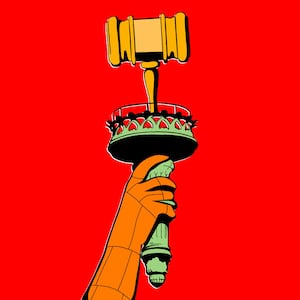The Manhattan grand jury that will decide whether to indict former President Donald Trump finally heard from a key witness on Monday—his former fixer Michael Cohen—but perhaps more notable than who they heard from were the antics one potential witness took to make it seem like she was also testifying on Monday.
Jennifer Weisselberg, a one-time Trump family confidant embroiled in a bitter divorce, walked into the DA's office midday Monday and claimed to reporters staking out the grand jury that she was about to help prosecutors nail Trump on something that is "bigger than any taxes, paper, insurance, banks, insurance.”
“It's bigger than money,” claimed Weisselberg, who’s the ex-wife of Trump Organization executive Barry Weisselberg and the former daughter-in-law of Trump’s longtime chief financial officer Allen Weisselberg.
However, in the hours after making her claims, two sources with direct knowledge of the investigation told The Daily Beast that Weisselberg had merely used the intense media focus on the case to bring attention to herself. Her attorney, Duncan Levin, who has guided her previous interviews with investigators about the Trump Organization's tax fraud, did not accompany her on Monday.
Weisselberg was actually at the DA’s office to testify before a separate grand jury totally unrelated to Trump concerning a personal matter, according to a person familiar with her situation. The media stunt casts doubt on her reliability as a witness and could prevent investigators from using her to testify in the future about alleged tax dodging at the Trump Organization, according to this person.
Trump jurors did hear from Michael Cohen, Trump’s former attorney, who detailed how his boss used him to cover up a hush payment to a porn star—breaking election laws to protect his 2016 presidential campaign.
Outside the DA’s office, Cohen told reporters he felt “a little twisted inside.”
“It's been a long time coming, five years now, give or take,” Cohen said. “This is not revenge. What this is, is about accountability… he needs to be held accountable for his dirty deeds.”
Investigators with the Manhattan District Attorney’s Office have long considered both Cohen and Weisselberg as problematic witnesses, due to their own personal demons. But both have been considered crucial to proving what they’ve described as Trump’s mob-like crimes.
The decision to put Cohen on the stand behind closed doors—something prosecutors have avoided doing for years in previous iterations of this investigation—indicates that Trump could be criminally indicted in the coming days, according to two people close to the investigation.
“Looks like they are turning over every stone,” one of those people said, on condition of anonymity.
Another sign that the investigation is moving into its final phases: Prosecutors are giving the former American president the chance to testify too—a rare opportunity that gives criminal defendants a final chance to convince a grand jury to let them off easy.
Typically, an indictment comes just days later.
According to half a dozen New York City defense attorneys, few people ever get that chance—and even fewer take it. Lawyers typically worry that a person facing indictment could actually make things worse by saying too much. But the mere fact that prosecutors are extending this invitation shows that grand jurors will soon be asked to decide whether to indict him.
Prosecutors at this office, formally called the New York County District Attorney’s Office, have been investigating Trump since halfway through his presidency. That’s when details emerged that Trump had ordered Cohen to silence the porn star Stormy Daniels and keep the National Enquirer from running her story—paying hush money to conduct a dirty tactic called “catch-and-kill.”
The federal prosecutors in the elite Southern District of New York came down hard on Cohen and put him behind bars. But with Trump at the White House and his appointed Attorney General overseeing the Department of Justice, the feds simply wouldn’t pursue the case any further.
That’s when the previous Manhattan DA, Cyrus Vance Jr., picked up the baton and assembled a team of local prosecutors to build a parallel case. These investigators discovered that Trump likely broke state laws by directing the hush money payment, faking real estate property values, and paying his company executives in a way that would dodge taxes, according to an ex-prosecutor’s tell-all book.
But Vance’s successor, Alvin Bragg Jr., wasn’t willing to seek an indictment during his first months in office. A grand jury investigation that was active in early 2021 was shut down, and the probe remained in limbo for nearly two years.
Now, just months after successfully convicting two Trump companies and their chief financial officer, Allen Weisselberg, Bragg has revived the grand jury investigation.
Editor’s note: This story has been updated to correct that Jennifer Weisselberg did not testify before the grand jury, even though she told reporters that she did.








